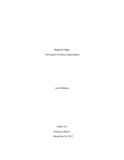| dc.description.abstract | According to studies, by engineers Arjen Hoekstra and Mesfin Mekonnen at the University of Twente in the Netherlands, "the U.S. consumed the highest annual totals: 1,207 billion, 1,182 billion and 1,053 billion cubic meters, respectively, followed by Brazil at 482 billion." Water sustainability is not seen as an issue since water is a renewable resource, but recently local rivers, lakes, and aquifers have been drying up do to overuse. Focusing on David Groenfeldt’s argument for “promoting ethics awareness and the application of ethic analysis to water decisions.” I will show how making water decisions that are ethical, by considering how the environment will be impacted when making decisions, will help restore the natural water sources. Everyone in the United States can help reduce water usage by viewing what they are using water for and, if possible, how can they reduce water usage and still maintain that activity. I am going to show how businesses, common people, and farmers and can reduce their water consumption by changing their ethics and using new technologies to help sustain local water resources. | en_US |

